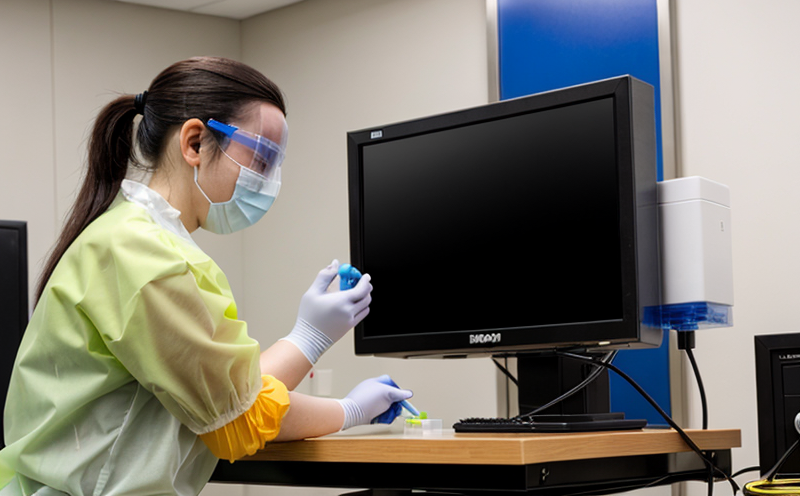Recombinant Factor C Endotoxin Testing (rFC Assay)
The Recombinant Factor C Endotoxin Test (rFC Assay) is a critical analytical procedure used to detect endotoxins in medical devices, pharmaceuticals, and other biopharmaceutical products. This test ensures that the product is safe for use by minimizing the risk of unwanted immune responses which can be triggered by endotoxins.
Endotoxins are lipopolysaccharides present on the outer membrane of Gram-negative bacteria. These molecules have the potential to cause serious adverse effects when they enter the human bloodstream, such as septic shock and inflammation. The Recombinant Factor C test is based on the principle that activated recombinant factor C (rFC) reacts with endotoxin in a way that can be measured by an optical or chromogenic detector.
This method offers several advantages over traditional methods like the Limulus Amebocyte Lysate (LAL) assay. It is less sensitive to non-endotoxic impurities, provides faster results, and can detect lower levels of endotoxin. The rFC Assay also has a broader quantitative range compared to the LAL test, which makes it particularly useful for testing products that have low endotoxin content.
The process involves several steps:
- Sample preparation: Ensuring the sample is free from interfering substances and is homogenous.
- Treatment of the sample with recombinant factor C: This activates the test reagent, making it sensitive to endotoxin activity.
- Detection phase: Monitoring the reaction between activated rFC and any present endotoxin. The intensity of this reaction will determine the amount of endotoxin in the sample.
The Recombinant Factor C Assay is widely used across various industries, including medical device manufacturing, pharmaceuticals, and biotechnology. It plays a crucial role in ensuring product safety by providing reliable data on potential contamination levels. This test is especially important for devices that come into direct contact with the human body or are injected into patients.
Our facility at Eurolab employs state-of-the-art equipment and highly trained professionals to perform these tests accurately and efficiently. We adhere strictly to international standards such as ISO 17253:2016, ensuring that our results are consistent and credible.
Benefits
The Recombinant Factor C Assay brings numerous benefits to the medical device industry:
- Enhanced Safety: By detecting even trace amounts of endotoxins, this test helps ensure that devices are safe for use by minimizing potential risks.
- Increased Efficiency: Faster results mean less time spent waiting for critical information, allowing for quicker decision-making processes.
- Better Quality Control: The precise measurements provided by the rFC Assay help maintain high standards in manufacturing and production.
- Regulatory Compliance: Our laboratory adheres to all relevant regulations and guidelines set forth by international bodies like the FDA, EMA, and WHO.
In addition to these benefits, the Recombinant Factor C Assay also supports innovation in medical device design by providing early insights into potential issues that could arise during clinical trials or post-market surveillance.
Eurolab Advantages
At Eurolab, we pride ourselves on delivering exceptional service and unparalleled expertise when it comes to Recombinant Factor C Endotoxin Testing. Here’s why you should choose us:
- Experienced Professionals: Our team consists of seasoned professionals with extensive experience in endotoxin testing.
- Advanced Equipment: We utilize cutting-edge technology and instrumentation to ensure accurate and reliable results.
- Comprehensive Reporting: In addition to numerical data, we provide detailed reports that offer valuable insights into your product’s safety profile.
- Customer Support: Our dedicated customer support team is always available to answer any questions or concerns you may have.
We understand the importance of timely and accurate results. That’s why our turnaround times are among the fastest in the industry, ensuring that you get your reports back quickly so you can move forward with confidence.
International Acceptance and Recognition
- The Recombinant Factor C Assay is recognized by major regulatory bodies including the FDA, EMA, and WHO. It meets the stringent requirements set forth in international standards such as ISO 17253:2016.
- This test is accepted globally for evaluating endotoxin levels in medical devices, pharmaceuticals, and other biopharmaceutical products.
The widespread acceptance of this assay reflects its reliability and accuracy. Many leading organizations rely on the results from Recombinant Factor C Assay to make informed decisions about product safety and regulatory compliance.





